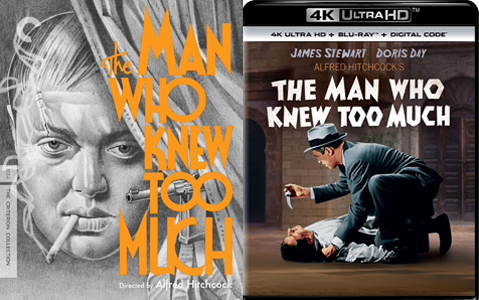“The Man Who Knew Too Much” (1934, 1956) is a rare film remade by its own director, and it’s a pretty good one … after initially being a pretty bad one. Although mildly interesting for someone studying Alfred Hitchcock’s works, the 1934 version – by not having a score — is a striking example of how dull certain types of films can be when lacking music.
It has a nonsensical plot, common among Hitchcock films but more grating here because it’s also boring. Characters are hard to keep track of at first, and Peter Lorre – later of “The Maltese Falcon” – stands out so much as the slimy kidnapper with a hasty combover that I wonder if he’s doing his own thing independent of Hitch’s direction.
Despite the lack of a score, music is central to the 1934 film because the grand finale takes place at London’s Royal Albert Hall, centering on an assassin’s gunshot planned to coincide with a cymbal crash. Although this plays like a small film compared to the remake, this finale is showy, as every seat in the hall is filled.

“The Man Who Knew Too Much” (1934)
Director: Alfred Hitchcock
Writers: Charles Bennett, D.B. Wyndham-Lewis, Edwin Greenwood
Stars: Leslie Banks, Edna Best, Peter Lorre
“The Man Who Knew Too Much” (1956)
Director: Alfred Hitchcock
Writers: John Michael Hayes (screenplay), Charles Bennett, D.B. Wyndham-Lewis (story)
Stars: James Stewart, Doris Day, Brenda de Banzie
Hitch shows rough-and-tumble staging ability with a fight scene wherein the kidnapped girls’ father throws chairs at his captors, and then a boffo shootout between the villains’ building and cops on the street. But the film’s tone is uneven in a bad way, sometimes feeling like a farcical comedy.
A second try
It’s no wonder the director wanted another shot at “The Man Who Knew Too Much.” Hitchcock said in the interview book “Hitchcock/Truffaut” (1967) that the original is the work of an amateur, the remake the work of a professional. I completely agree.
The 1956 version is not so much better to rank among the director’s top-tier works, but it does boast the easily likeable James Stewart and Doris Day as the American tourist parents of a boy kidnapped in Morocco. The plot is the same – the father had heard the dying words of a murdered man, vaguely about an international political assassination plot – and therefore the villains aim to hold his son so he’ll keep his mouth shut till the assassination at Albert Hall is pulled off.
For a change, Hitch – working from John Michael Hayes’ reworked screenplay – hangs a lampshade on the stupid complexity of this scheme. If someone knows about your assassination plot, it seems killing them would be the obvious approach. (Remember, they killed the first guy who uncovered the plan.) If that won’t work, why not cancel the plan and wait for the next opportunity? It turns out the underlings chose to kidnap the boy, and the main baddie flat-out tells them this was a ridiculous move.

Of course, the likelihood or sensibility of a plot is never the point in a Hitchcock film. It’s about the suspense and the chess moves. “The Man Who Knew Too Much” is ironically titled, because it’s initially about how Stewart’s Ben and Day’s Jo know too little.
We share their frustrated feeling. Ben will happily give the villains all the money he has if they’ll return his son. But to the villains, there’s nothing he can give other than his silence up through the assassination. So the parents become amateur investigators as the cops shadow them – a step behind or to the side – a structure also seen in “To Catch a Thief” and “North by Northwest.”
Music in the mix
I think “The Man Who Knew Too Much” is aiming for a moral conundrum, but it undercuts it because the assassin’s target is at best a bland political figure, and at worst he’s not all that innocent himself. Still, Jo does want to save both lives – the foreign prime minister’s and her son’s – if possible, and she comes up with a clever solution at the concert.
In a stark course correction from the original, the 1956 version puts music front and center, with Day singing “Whatever Will Be (Que Sera, Sera).” It’s a standard now, but it was fresh at the time, winning the Oscar for Best Original Song. Bernard Hermann, who scores the film, then performs on-screen as himself, conducting the orchestra and singers.
The rendition of “Storm Cloud Cantata,” new when used in the original film, is much more grandiose here as it plays out nearly in its entirety. That’s a good thing for showmanship, but it also makes me realize “The Man Who Knew Too Much” is very much a style piece. (Still, these films are staple examples of the trope of a sniper at a concert; see “Mission Impossible: Rogue Nation” for one of the grandest recent examples.)
Even in the remake, the plot is ridiculous, but the emotions of desperate parents do help sell the material. Side trips into bizarro-comedy – this time featuring Ben’s mistaken trip to a taxidermist’s shop that culminates in a fight (the actual villains’ cover is a church) – are far more bizarre than comedic. Again, an uncomfortably uneven tone results, although it’s not as jarring as in the original.
And so we have a remake that’s much better than the original, and another solid Hitchcock-Stewart collaboration, if far from the level of “Rear Window” and “Vertigo.” Anyone wondering why Hitchcock would remake his own work needs only to watch both versions of “The Man Who Knew Too Much” back-to-back and you’ll be armed with more than enough information.
RFMC’s Alfred Hitchcock series reviews works by the Master of Suspense, plus remakes and source material. Click here to visit our Hitchcock Zone.
1934 version: 2 stars
1956 version: 3.5 stars

